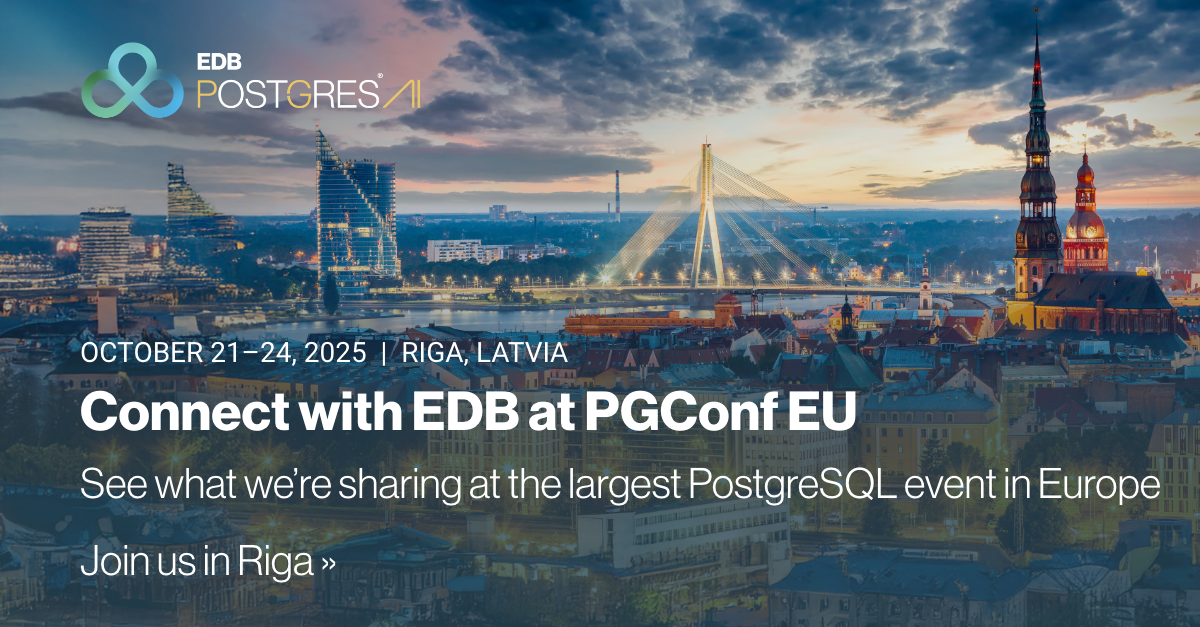When PostgreSQL Conference Europe 2025 opens its doors in Riga, Latvia, it will mark an expansion of what this vibrant community is capable of. The fifteenth edition of PGConf.EU adds a new dimension with Community Events Day, a full day of collaborative sessions before the conference begins, launched through an open call for proposals and replacing the workshop and training format of previous years. It’s a recognition that Postgres is sustained not only by the code that defines it, but by the relationships that carry it forward.
EDB’s presence this year mirrors that evolution. Across the schedule, EDB engineers, advocates, and organizers are shaping conversations that stretch from community health to AI architectures, from accessibility to observability. Together, their work traces how Postgres keeps expanding its meaning, not just its feature set.
Community as the foundation
The week begins with a focus on people.
Floor Drees, Senior Program Manager for Community at EDB, is helping coordinate three anchor sessions that define the new Community Events Day: the PostgreSQL on Kubernetes Summit, the Extensions Showcase, and the Community Organizers Conference.
The goal of these sessions isn’t to teach a single skill, but to connect the infrastructure of the ecosystem itself—the organizers, speakers, mentors, and contributors who make Postgres resilient. The Extensions Showcase, meanwhile, highlights new and experimental PostgreSQL extensions in a fast-paced demo format, giving community developers space to present their work and spark collaboration.
At the Community Organizers Conference, Laura Minen, Support Projects Coordinator, will tell the story of EDB Amigos & Allies, a volunteer-led employee resource group that began as a small experiment and grew into a global program for belonging. Her talk, “Low-Cost, High-Value Events,” examines how simple, low-budget community ideas can yield outsized impact when driven by purpose.
Accessibility and inclusion will be another thread running through the day. Drees joins Karen Jex (Crunchy Data/Snowflake) to share how PostgreSQL Europe’s Diversity Committee is making this year’s PGConf.EU “Sunflower Friendly.” The designation comes from a global initiative that helps event organizers identify and support attendees with hidden disabilities. The conversation goes beyond logistics; it’s about recognizing the diversity of experience that makes a community sustainable.
Later, Drees appears with Jay Miller (Aiven) and Celeste Horgan (Snowflake) in a discussion on helping engineers deliver stronger talks. The trio will explain how structured mentorship and feedback can turn presentation anxiety into clarity, and how speaking programs can become internal engines for professional growth. Come learn how three former colleagues took these concepts to different companies and formed it to fit their needs.
Each of these sessions offers a glimpse into Postgres’s social architecture: a community that treats inclusion, mentorship, and shared storytelling as integral to its technical success.
Building the next technical chapter
Let’s start with The PostgreSQL on Kubernetes Summit, which will bring together voices from across the ecosystem, including Gabriele Bartolini, Jonathan Battiato, Jonathan Gonzalez, and Danish Khan, to explore the operational realities of running databases in containerized environments.
Jonathan Battiato’s session focuses on benchmarking performance in Kubernetes, a critical step before production deployment.
Jonathan Gonzalez dives into networking and security with Cilium, demonstrating how eBPF-based observability helps DBAs secure inter-pod communication without sacrificing visibility.
Gabriele Bartolini will walk through the handful of CloudNativePG commands that every DBA should know, translating Kubernetes abstractions into familiar database terms.
Danish Khan will close the loop with a live deep-dive into performance tuning and resource optimization for containerized Postgres clusters.
Taken together, these sessions form a complete narrative arc: from understanding the hardware limits that define your clusters to tuning the workloads that live within them. The underlying message is practical but optimistic: cloud-native doesn’t have to mean opaque or unapproachable.
Meanwhile, Boriss Mejías will co-organize Establishing the PostgreSQL Standard: What’s Postgres Compatible? As Postgres becomes "the new Linux" for the enterprise, this question becomes increasingly important. This half-day session invites Postgres developers, contributors, and community members to define a practical framework of criteria and tests for PostgreSQL compatibility. It’s a subtle but essential act of governance for an ecosystem that prizes openness.
At the same time, Torsten Steinbach, EDB’s Chief Architect for Analytics and AI, will co-host the PostgreSQL & AI Summit. The event invites developers and data scientists to share how Postgres is being used inside AI workflows, from vector search and feature stores to retrieval-augmented generation (RAG) pipelines. The agenda underscores how Postgres is evolving not just as a storage engine, but as a participant in the intelligence layer of enterprise software.
That theme continues in Steinbach’s sponsor-track keynote, From Transactions to Intelligence: Postgres for Open AI & Analytics. The talk traces how Postgres has expanded beyond its transactional roots into the backbone of analytical and AI workloads, following three distinct paths:
The organic path represents Postgres’s own native growth—think innovations like pgvector and WarehousePG that extend its reach without altering its core.
The hybrid path captures how Postgres integrates with other open-source systems, such as Apache DataFusion for distributed query processing or Iceberg REST catalogs for metadata federation.
And the augmented path points toward what’s next: a world where Postgres participates directly in agentic AI environments through modern control protocols and machine-connectivity platforms.
In a sense, the talk argues for Postgres as both a database and a framework for intelligence, capable of powering the next generation of data-driven systems while preserving the sovereignty and transparency that enterprises demand.
The technical throughline continues with Yogesh Jain’s session, Unified Observability: Monitoring Postgres Anywhere with OpenTelemetry. Jain will demonstrate how to collect and visualize metrics across cloud, on-prem, and Kubernetes environments using open telemetry standards—a critical step toward full observability without vendor lock-in. He’ll show how integrations with Prometheus, Loki, and Grafana deliver enterprise-grade visibility at a fraction of commercial cost. It’s a pragmatic answer to a growing question: how do you monitor complexity at scale without surrendering control?
Álvaro Herrera and Antonin Houska (Cybertec) continue the technical thread with Table Repacking Done Right. Their upcoming feature, REPACK CONCURRENTLY, is designed to eliminate table bloat without the downtime that comes with VACUUM FULL. The talk previews its planned integration in PostgreSQL 19 and offers a deep dive into how it works—a small change with big implications for DBAs managing production workloads at scale.
Stewardship, Inclusion, and Longevity
Beyond technology, several sessions focus on what we like to call “the long game of open source:” the choices that sustain projects long after they’re launched.
In They Grow Up So Fast, Floor Drees and Gabriele Bartolini will recount the process of donating CloudNativePG to the Cloud Native Computing Foundation, moving it from company stewardship to community governance. The transition required months of documentation, legal alignment, and community consultation. The result is a model for how open-source projects can secure their independence while maintaining enterprise-grade momentum.
Martín Marqués and Giulio Calacoci take a complementary view in Barman, Past, Present, and Future, revisiting thirteen years of development in one of Postgres’s earliest backup and recovery tools. Their story is one of continuity: adapting to new versions, balancing user requests with community proposals, and nurturing a project that has quietly become foundational.
These sessions illustrate that maturity in open source isn’t about age; it’s about stewardship.
That same theme of long-term sustainability carries into the panel How to Work with Other Postgres People, moderated by Boriss Mejías and featuring Floor Drees, Jimmy Angelakos (pgEdge), and Karen Jex. The discussion addresses mental health, neurodiversity, and collaboration in distributed open-source environments. It’s an acknowledgment that technical excellence depends on psychological safety and a reminder that communities thrive when they make space for difference.
Modernization, Sovereignty, and Learning
As PGConf.EU wraps, attention turns toward modernization and education, the ongoing process of translating Postgres’s potential into enterprise practice.
Raphael Salguero Aragón’s session, Migrating to PostgreSQL: Strategies, Sovereignty, and Success, offers a methodical guide for organizations moving from proprietary systems such as Oracle, MySQL, and Microsoft SQL Server. The talk examines how to select the right migration strategy, reduce downtime, and preserve data integrity while keeping sovereignty and compliance front and center. For enterprises balancing modernization with regulation, this session bridges technical execution and policy reality.
Learning itself remains a defining characteristic of the Postgres community. Boriss Mejías’s Data Modeling with PostgreSQL uses the metaphor of chess—honoring Riga’s own Mikhail Tal—to show how schema design shapes application logic. In his other session, Understanding MVCC, he explains the mechanisms behind PostgreSQL’s multiversion concurrency control and what they mean for developers seeking predictable performance. Lætitia Avrot then closes the analytics thread with Can PostgreSQL Compete with Analytics Specialists? questioning whether Postgres, when properly tuned, can rival specialized engines like DuckDB and ClickHouse for analytical workloads. Her answer is nuanced: Postgres may not always be fastest, but its flexibility, simplicity, and community support often make it the most pragmatic choice.
Together, these talks reveal a culture that prizes depth of understanding, one where education is both a technical discipline and a shared act of care.
Many Futures, One Community
Across four days in Riga, EDB’s role within PGConf.EU isn’t confined to a single product or discipline. It spans community, technology, stewardship, and governance—the full spectrum of what makes open source resilient.
The conversations happening in these rooms will ripple outward: better migrations, more observable infrastructures, AI systems that remain accountable, and communities that continue to welcome new voices.
Postgres’s future, it turns out, isn’t one story. It’s many: interconnected, collaborative, and still being written by the people who show up to build it. We hope to see you in Riga.

